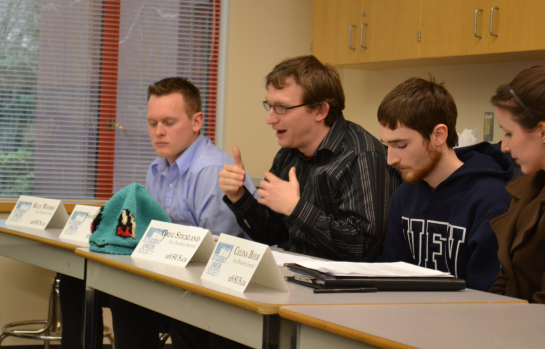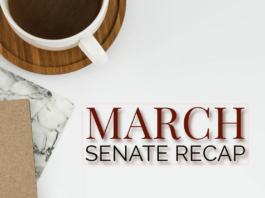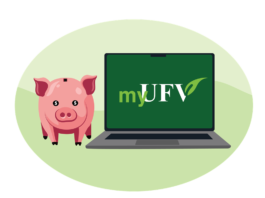By Nick Ubels (The Cascade) – Email
Print Edition: March 7, 2012
The hot button issue of student apathy once again took centre stage at last Wednesday’s Student Union Society (SUS) election’s all-candidates meeting, where hopeful SUS representatives offered a variety of solutions to this endemic problem facing an expanding and decentralized university.
Low voter turnouts – hovering around one per cent of eligible students in the last SUS election – are telling of a widespread lack of involvement at UFV. Adding urgency to the discussion was the backdrop of five empty chairs reserved for representative-at-large candidates who were not in attendance at Wednesday’s meeting.
These five candidates—Vinu Abraham, Vitor Carvalho, Ahmed Hussein, Jay Mitchell, and Ryan Petersen—were not only absent from the Abbotsford meeting on March 1, but also failed to submit written statements. Fellow representative-at-large candidate Rachel Waslesky was also absent, but forwarded a brief opening statement to be read by moderator and SUS communications administrator Jhim Burwell in her place.
Celina Beer, candidate for vice president internal, addressed the issue of accountability in the fairly open-ended representative-at-large position by pledging to introduce set agendas that still allowed the representatives to choose which issues they would like to advocate. When asked to comment on the meeting’s many absences, Beer called it a “sad fact.”
“Unfortunately, I can’t vouch for why that is,” she said.
All told, only two of eight candidates for representative-at-large—SUS longtime member Debbie Ellis and newcomer Nicholas Willms—made an appearance at the Abbotsford all-candidates meeting. None of the incumbent representative-at-large candidates made an appearance.
Representative-at-large was not the only position with a handful of no-show candidates, however. Two candidates for vice president academic, Daniel van der Kroon and Marin Beck, were also absent, though Beck did forward a written statement. This left current representative-at-large Mehtab Singh Rai the only candidate for VP academic in attendance.
There are eight representative-at-large positions available in the upcoming election and only eight candidates running for those positions, meaning that each candidate is running uncontested; students will simply be asked to vote yes or no for each candidate.
VP internal candidate Greg Stickland added that, if elected, he would set clearer standards for representatives’ monthly reports.
“It’s not fair if they don’t know what’s expected from them,” he said. “We kind of have a joke on the board, and that’s that Devon [McHardy] is our VP internal and VP infernal, and I’d be taking over that role, but that’s not exactly how I run things. I also set an example as well.”
Debbie Ellis, rep-at-large candidate, proposed that the monthly reports be made publically available in hard copy at the SUS office to increase representative accountability to student members.
“I would have no problem releasing my report,” she said.
Incumbent SUS president Carlos Vidal, who is running uncontested after Wyatt Scott dropped out of the race, stressed the importance of leading by example to increase interaction between students and their SUS representatives.
“I have a class today from 11:30 to 2:30, but I just said to my teacher yesterday that I’ve got to leave really quick to go to an important meeting and that was no problem,” he said. “So I think we’re looking to our candidates here for who’s going to be a strong person to be able to take that role, because there does need to be a level of authority and leadership in making sure people are responsible.”
Reaching out to students
Candidate for Vice President East and third year political science major Kyle Wierks pledged to work towards greater student involvement on both the Abbotsford and Chilliwack campuses during his opening statement.
“I believe in UFV,” said Wierks. “I want to see it grow and I want to see it become a hub of student activity. We have a lot of students who come to class and then leave and don’t stay and don’t get involved. I believe that that’s detrimental both to student life and to the university.”
When asked to expand on some of the specific ways in which he would help achieve Weeks of Welcome activities to set a participatory tone early in students’ UFV experience as well as introducing program-specific designated study areas, much like the science study area, for other programs. He also recommended increased advertising for campus events through social media and posters.
Unopposed candidate for vice president social Christian Doyle criticized Wierks’ plan for not bringing anything new to the table as far as ways to bring together SUS representatives and their student members.
“You mentioned that we need to make sure students get involved, we need to make sure we advertise and put out schedules, but we have done that in the past and we’ve done that this year,” said Doyle. “We did a lot of things that you’re saying, so I’m a little curious what you plan to do differently.”
VP internal candidate Greg Stickland quickly chimed in with his “Campus Crunch” project in which SUS would produce a brief, weekly YouTube video that would fill make students aware of upcoming events.
Beer countered that SUS is already reaching out to students through other campus media without much success.
Shane Potter, Wierks’ opponent in the race for VP east, said that SUS has been taking steps in the right direction by moving from outmoded communication efforts like MyUFV, email newsletters, and posters—which students are “saturated” with on a daily basis—to social media and other new ways of connecting with students.
“Honestly, I see it working,” he said. “People are taking a more vested interest in student politics. We need to think of innovative ways to connect with students in person and through social media.”
Vidal echoed Potter’s enthusiasm for SUS’s recent attempts to find new and better ways to communicate with UFV students.
“I think we’re working in the right direction,” he said. “But I think we need to bump up our advertising to drive people to that [Facebook] page.”





